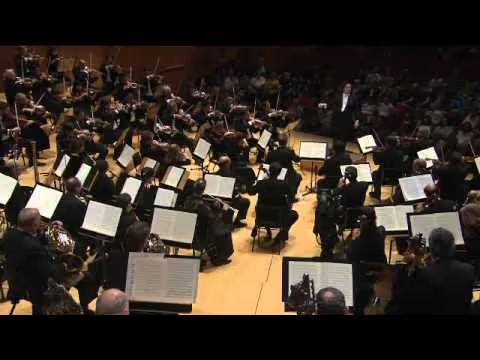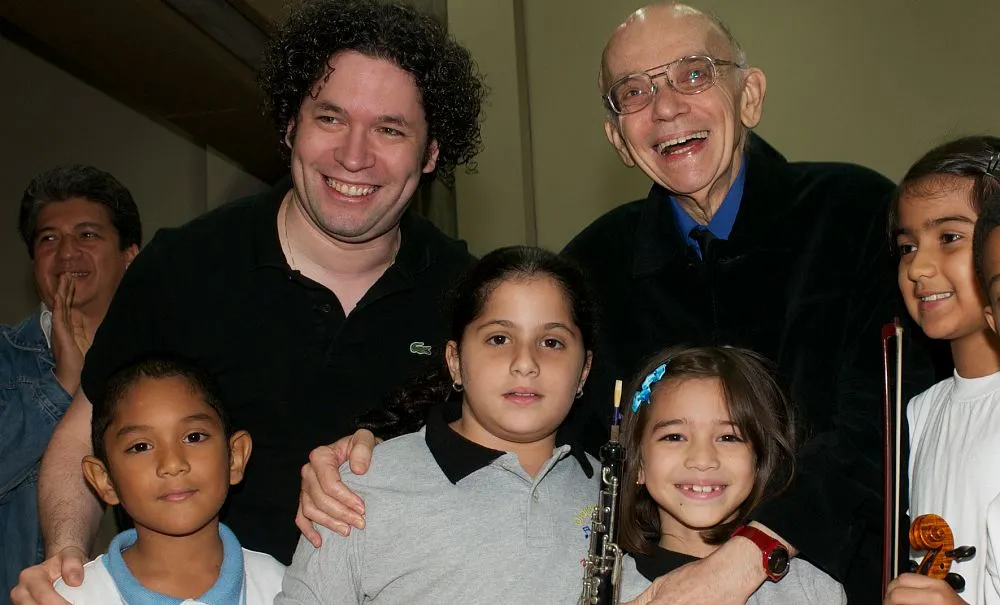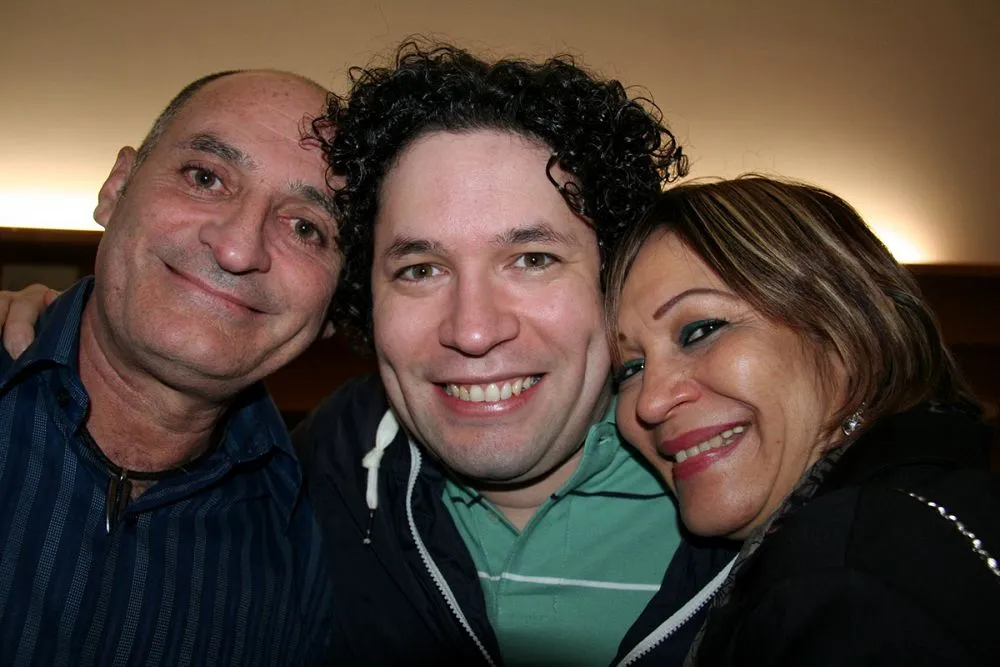Childhood
Growing Up through Music
Music shaped the joys and dreams of Gustavo Dudamel’s childhood.
Son of a trombonist and a singing teacher, Gustavo was playing with symphonies when others were still busy with finger-painting. In the Venezuelan city of Barquisimeto, where crime and drugs threatened many of his young peers, Gustavo credits the extraordinary music education that he enjoyed with his remarkable success.
As a young child, Gustavo Dudamel yearned for the day when his arms would be long enough to enable him to play the trombone, like his father. But at his local "nucleo", music teachers found a violin to fit his young limbs, and Gustavo found his place in the world of the symphony orchestra.
Concerts and orchestras fascinated him; by the time he was 10 years old, Gustavo was reading scores the way other children read novels.
"I remember that I had a favorite game. I had little toy soldiers, but not with guns. I would put them into orchestral positions, and then I would put on some music, and I would always be the conductor. It was fun!"
Visionary economist, organist and politician José Antonio Abreu started Venezuela’s "El Sistema" in 1975, with five children in a parking garage.
Almost four decades down the line, some half a million children, most of them from communities living below the poverty line, have grown up in the orchestras of El Sistema.
Like all youngsters who join "El Sistema", Gustavo Dudamel learned social responsibility alongside musicianship. It is fundamental to the principals of "El Sistema" that older students act as mentors for their younger peers, and that successful professional musicians will also take on work as teachers and leaders. Children learn conducting in the same way that they learn instrumental skills–deep end first.
"I was in a rehearsal in Barquisimeto one day, and the conductor was sick, and the podium was empty, so I thought, OK, and I took the baton.
"I hadn’t studied. I just thought, ‘I can do this.’ And it was funny, because my friends were there, playing. And they all laughed. But within five minutes it had changed. They all thought, OK, it’s time to work now. And that was beautiful.
"Then the conductor came and said, ‘Ah, you are very good! You conduct this concert.’"
Gustavo was twelve years old. Five months later he was given the assistant conductor post in Barquisimeto; by the following year, he had his own chamber orchestra.
At the age of 15, he found himself on the podium of the nation’s flagship Simón Bolívar Youth Orchestra of Venezuela (now the Simón Bolívar Symphony Orchestra of Venezuela), of which he remains chief conductor.
"Of course, there were a lot of other child conductors," he remembers. "Many. When I was twelve, I had a conductor friend who was eight. He was conducting Rossini, Charpentier, and the national anthem. This is normal in Venezuela."
Even in a country where it is normal to nurture young talent, Gustavo’s gift was recognized as exceptional–enough so to earn him lessons with El Sistema founder and director José Antonio Abreu, and not long afterwards, the attention of top international conductors Sir Simon Rattle and Claudio Abbado.
In 2002, he was invited to study with the Berliner Philharmoniker under Sir Simon Rattle. The orchestra’s Academy is set up for instrumentalists, but an exception was made for this gifted young conductor; in the absence of a living bursary, he stayed at the home of then-orchestral trumpeter Thomas Clamor, a frequent guest in Venezuela himself.
"He’d spend entire nights watching my DVDs of the orchestra, and listening to CDs," Clamor recalls.
"I gave him scores, and he kept them all on the second bed in the guest room. He’d be up all night learning with such diligence and application that, at some point, my wife and I started to worry. And we said, ‘Gustavo, you must sleep!’
"But it was extremely impressive for me to see the single-mindedness with which he pursued musical knowledge. He wanted to learn, learn, learn, to try new things, implement them, rehearse, prepare well for the orchestra that he was working with. I have never encountered anybody who worked harder."
Swedish contralto Anna Larsson, who has known Gustavo for a decade, tells a similar story.
"I think it is one of the downsides to being considered to be a Wunderkind. People think that you can just come along and do it, that you don’t have to prepare. But it’s the opposite. I think every Wunderkind is like that because they’ve been working so hard. If you see what Mozart did as a child, working with his father on composing and performing; or Michael Jackson; or the Swedish tenor Jussi Björling; you’ll see they’ve been working like crazy from when they were babies. Gustavo has always worked hard, and he is one of the best-prepared conductors I’ve ever sung with."
Dudamel grew with the Simón Bolívar Youth Orchestra of Venezuela. Unlike most national youth orchestras, which re-audition each year and keep membership below a cut-off age, the Simón Bolívar retained its membership, and grew with its players.
In 2000, he led the orchestra on its first German tour. Further tours followed, along with a Deutsche Grammophon recording contract. Today, Gustavo and the Simón Bolívar Symphony Orchestra of Venezuela are in annual demand on the world’s leading stages.
"He grew up with these musicians," says Thomas Clamor. "They share the same past. And when he’s together with them, they’re like family, and it does him good, I believe. In that atmosphere he can move, and can generate energy."






.webp)



.webp)
.webp)
.webp)
.webp)





.webp)
.webp)
.webp)


.webp)


.webp)
.webp)


.webp)